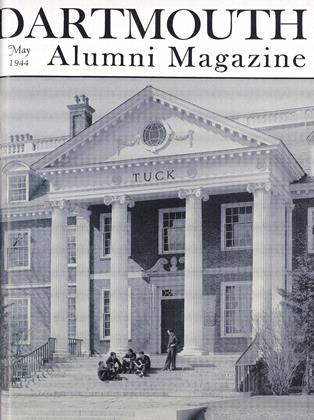WHEN DR. DAVIDSON at Harvard first sought to inspire glee clubs to produce a better kind of music than had been traditional among such organizations everywhere, a storm of protest arose. The glee clubs were "going highbrow." The songs they sang were not "glees." The fight to produce more worthy music was an uphill one at the start, but the apostles of the new movement were not discouraged and kept everlastingly at it until gradually the aggrieved Harvard alumni became reconciled to the idea.
Of course any good thing can be overdone, and this one could be—the more easily through desire to combat dogged opposition. That pitfall, one hopes, will be avoided. There is certainly room for the belief that college musical organizations should devote themselves to something meatier than the "Bulldog on the bank and the Bullfrog in the pool" style of music prevalent in the pre-Davidson era. The success thus far met indicates that the belief is a reasonable one.
Few efforts elsewhere have been as ambitious as that made at Harvard, but it is obvious that everywhere there is a tendency to get away from the juvenile nonsense which in the older days formed the backbone of every glee club program. Is there any good reason why not? After all, colleges are supposed to have their highbrow side; and music is one of the noblest of the liberal arts, which a truly liberal education should lead one to appreciate as one of the finer things in life. One may feel a nostalgic regret for the days when even the Harvard glee clubs went in for "Imogene Donahue" and "Schneider's Band," but the most this should do is to mitigate in worthy ways what, to the untutored layman, would be a too heavy program. Not every musical palate can savor the mode Palestrina; but most of us can be taken gently by the hand and led to appreciate better stufE than glee clubs used to purvey in the days when their loftiest flight of fancy was something called the "Arion Waltz" or "The Soldier's Farewell."
Granted that student songs everywhere represent more or less the unbuttoned mood and can be utilized even by such a pundit as Johannes Brahms in an Academic Overture, the fact remains that a well trained glee club can and should assist our aspirations by giving us, in moderation, something nobler to counteract the tripe popularized by the radio and the carefree songs replete with barbershop chords. Harry Wellman's setting for the Hovey "Dartmouth Song" and Professor Whitford's admirable music for McDuffee's "Dartmouth Undying" afford a promising beginning, commanding the approval of such exigent critics as Deems Taylor and the late Philip Hale, who grew up in college glee clubs' ignobler days.
 View Full Issue
View Full Issue
More From This Issue
-
 Article
ArticleTHE GREEN FLIES HIGH
May 1944 By ARTHUR SAMPSON -
 Class Notes
Class Notes1914
May 1944 By DR. WALLACE H. DRAKE, JOHN F. CONNERS -
 Lettter from the Editor
Lettter from the Editor'Round the Girdled Earth
May 1944 -
 Class Notes
Class Notes1917
May 1944 By MOTT D. BROWN JR., DONALD BROOKS -
 Class Notes
Class Notes1934
May 1944 By WILLIAM C. EMBRY -
 Class Notes
Class Notes1918
May 1944 By ERNEST H. EARLEY, DONALD L. BARR













